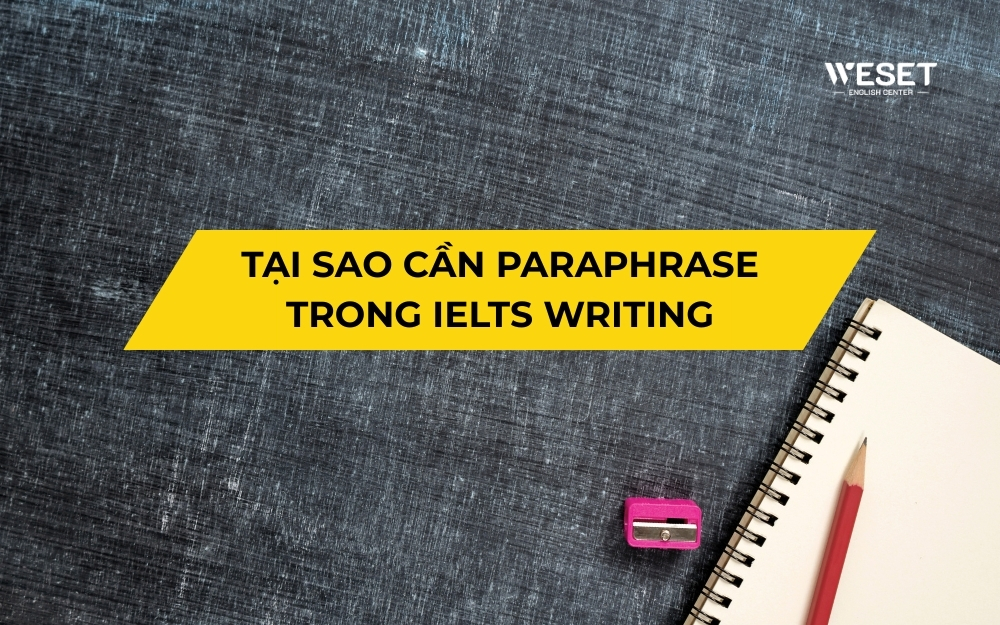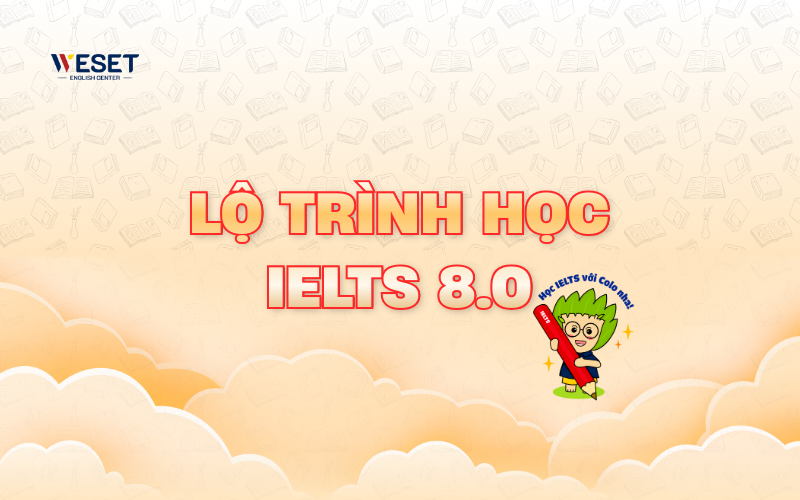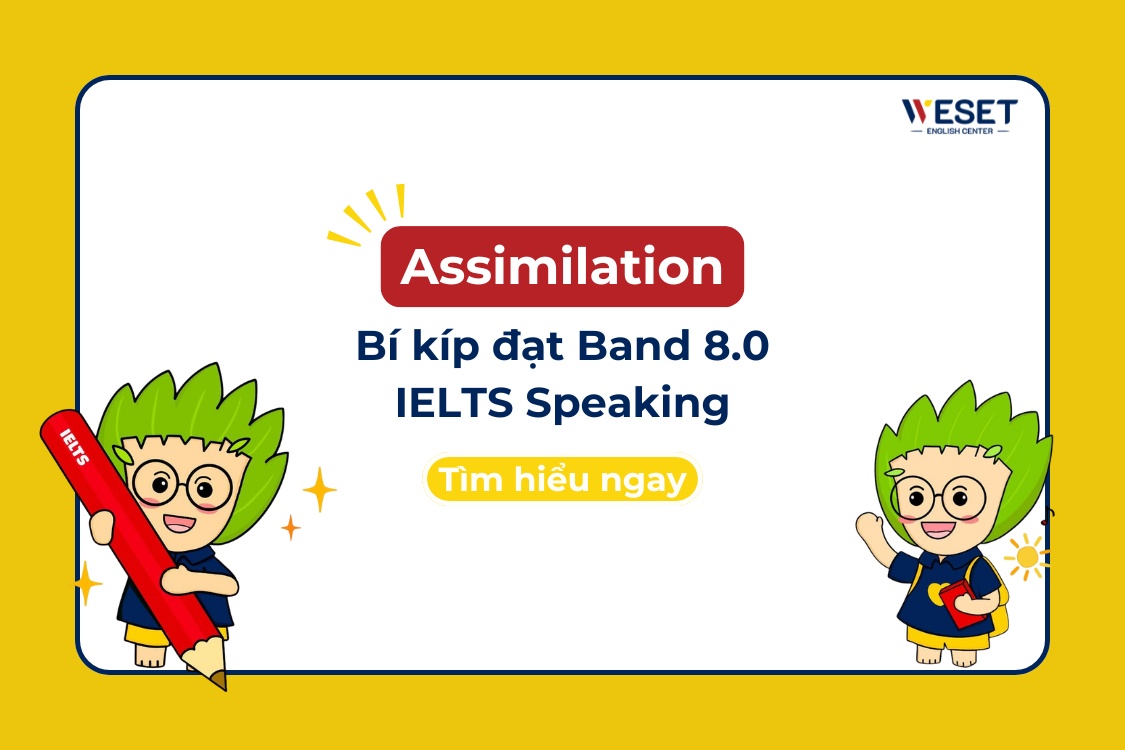Trang chủ Blog Blog IELTS Paraphrase là gì? 7 cách paraphrase ăn điểm IELTS Writing
Paraphrase là gì? 7 cách paraphrase ăn điểm IELTS Writing
- Jonathan M. Pham
- Blog IELTS
MỤC LỤC
Paraphrase là gì? Câu hỏi mà hầu hết những người học tiếng Anh, đặc biệt là các bạn đang ôn luyện IELTS, đều từng băn khoăn. Kỹ năng paraphrase không chỉ giúp bạn tránh được lỗi đạo văn mà còn thể hiện được sự linh hoạt và vốn từ vựng phong phú của bản thân.
Trong bài viết này, cùng WESET tìm hiểu sâu hơn về paraphrase là gì, tại sao paraphrase lại quan trọng và 7 cách paraphrase hiệu quả để “ghi điểm” trong bài thi IELTS Writing nhé!

Paraphrase là gì?
Paraphrase là gì? (What is Paraphrase?)
paraphrase là gì? Đó là kỹ năng diễn đạt lại một ý tưởng, câu, hoặc đoạn văn bằng từ ngữ của chính mình mà vẫn giữ nguyên được ý nghĩa gốc. Mục đích của việc paraphrase không phải là thay đổi hoàn toàn nội dung, mà là “thay áo mới” cho câu văn để nó trở nên độc đáo và phù hợp hơn với ngữ cảnh.
Paraphrase khác với tóm tắt (summarize) ở chỗ tóm tắt chỉ rút gọn ý chính, còn paraphrase đòi hỏi bạn phải diễn đạt lại toàn bộ nội dung một cách chi tiết hơn.
Tại sao cần Paraphrase trong IELTS Writing?

Paraphrase trong IELTS Writing
Tại sao kỹ năng paraphrase lại quan trọng đến vậy trong bài thi IELTS Writing?
- Tránh lỗi đạo văn: Trong IELTS Writing Task 2, đề bài thường đưa ra một nhận định và yêu cầu bạn nêu quan điểm. Nếu bạn chép lại nguyên văn đề bài vào phần mở đầu (introduction), bạn sẽ bị trừ điểm vì lỗi đạo văn. Kỹ thuật paraphrase giúp bạn viết lại câu mở đầu một cách tự nhiên và chính xác.
- Ghi điểm từ vựng (Lexical Resource): Khả năng sử dụng từ đồng nghĩa, trái nghĩa, hay thay đổi cấu trúc câu để paraphrase hiệu quả sẽ chứng tỏ vốn từ vựng và ngữ pháp đa dạng của bạn. Đây là một trong bốn tiêu chí chấm điểm quan trọng của bài thi IELTS Writing.
- Nâng cao tính mạch lạc và tự nhiên: Khi bạn biết cách paraphrase linh hoạt, bài viết của bạn sẽ không bị lặp từ, lặp cấu trúc, giúp câu văn trở nên mượt mà và logic hơn.
Với những lý do trên, việc thành thạo cách paraphrase là một yếu tố then chốt để đạt band điểm cao trong IELTS Writing.
Paraphrase quan trọng thế nào đối với 4 kỹ năng IELTS?
- Paraphrase giúp bạn tránh các lỗi lặp từ, giúp câu văn, lời nói mượt mà, trôi chảy hơn.
- Khi paraphrasing, bạn đã chứng minh được khả năng sử dụng từ vựng, ngữ pháp linh hoạt, phong phú, do đó bạn sẽ được đánh giá cao hơn cho tiêu chí Lexical resource đối với kỹ năng Speaking và Writing.
- Trong quá trình rèn luyện kỹ năng paraphrase, bạn sẽ có cơ hội học và ghi nhớ rất nhiều từ đồng nghĩa, cấu trúc ngữ pháp để viết lại câu tương đương. Việc này hỗ trợ vô cùng đắc lực cho 2 kỹ năng Listening và Reading, bởi hầu hết các câu hỏi IELTS Listening hay Reading đều đòi hỏi khả năng nghe – đọc – hiểu câu đã được paraphrase lại.
Ví dụ: Đề bài Listening yêu cầu bạn nghe một đoạn hội thoại về một người đi đến các địa điểm sau: gas station, bookstore, shopping mall, market.
Khi đó, thứ bạn cần nghe không phải chính xác là các từ được nhắc đến trong đề, mà là một cụm từ có ý nghĩa tương đương.
Ví dụ: “bookstore” sẽ được paraphrase lại là “a place that sells novels and comics.”
Đối với Reading cũng tương tự, những thông tin trong các câu hỏi dạng True/False/Not Given, Yes/No/Not Given, Gap Filling, hay Multiple Choice thường đã được biến đổi so với thông tin trong bài đọc. Nếu bạn không có khả năng paraphrase thì rất khó để đạt điểm cao.
Thành thạo kỹ năng Paraphrase không phải là điều dễ dàng mà cần thời gian rèn luyện chăm chỉ. Có nhiều cách để luyện tập kỹ năng này, tuy nhiên các bạn có thể bắt đầu với cách phổ biến và đơn giản nhất, chính là học từ đồng nghĩa (synonym). WESET đã giúp các bạn tổng hợp loạt từ đồng nghĩa phổ biến nhất dưới đây theo thứ tự bảng chữ cái để các bạn dễ dàng học nhé.
4 bước để Paraphrase hiệu quả

4 bước để Paraphrase hiệu quả
Để thực hiện kỹ năng paraphrase một cách hiệu quả, bạn có thể áp dụng 4 bước cơ bản sau đây:
1. Hiểu rõ nội dung cần Paraphrase
Trước khi bắt tay vào viết lại, bạn cần đảm bảo rằng mình đã nắm rõ nội dung gốc. Đọc kỹ câu hoặc đoạn văn, xác định ý chính và các ý phụ. Nếu không hiểu đúng, bạn có thể sẽ paraphrase sai nghĩa và làm mất đi giá trị của câu văn. Đây là bước đầu tiên và quan trọng nhất.
2. Xác định từ khóa và cấu trúc cần thay đổi
Sau khi đã hiểu, hãy gạch chân hoặc xác định những từ khóa quan trọng và cấu trúc câu chính.
- Ví dụ, trong câu “The government should invest more in public transport to reduce traffic congestion”, các từ khóa là “government”, “invest”, “public transport”, “reduce”, “traffic congestion”. Việc này giúp bạn biết mình cần thay đổi những gì.
3. Sử dụng từ đồng nghĩa hoặc cấu trúc tương đương
- Ví dụ, “government” có thể thay bằng “authorities”, “invest” thay bằng “allocate funds for”, “public transport” thay bằng “mass transit system”, v.v. Bạn cũng có thể thay đổi cấu trúc câu, ví dụ từ câu chủ động sang câu bị động. Đây là phần cốt lõi của kỹ thuật paraphrase.
4. Kiểm tra lại nghĩa
Sau khi đã viết lại câu văn, hãy so sánh nó với câu gốc. Cả hai câu có cùng một ý nghĩa không? Cấu trúc ngữ pháp đã chính xác chưa? Việc kiểm tra lại sẽ giúp bạn phát hiện và sửa chữa những lỗi sai không đáng có. Một mẹo nhỏ là bạn có thể đọc lại câu đã paraphrase và xem nó có tự nhiên không.
7 Cách Paraphrase ăn điểm IELTS Writing
Để đạt được band điểm cao, bạn cần biết nhiều hơn một cách để paraphrase. Dưới đây là 7 kỹ thuật paraphrase cực kỳ hiệu quả mà bạn nên áp dụng:
1. Đảo thứ tự từ trong câu
Đây là một trong những cách đơn giản và phổ biến nhất. Bạn có thể đảo vị trí các cụm từ trong câu để tạo ra một câu mới nhưng vẫn giữ nguyên ý nghĩa.
Ví dụ:
- Gốc: “The government should provide free healthcare for all citizens.”
- Paraphrase: “Free healthcare should be provided for all citizens by the government.”
2. Dùng từ đồng nghĩa/trái nghĩa
Tìm các từ đồng nghĩa hoặc trái nghĩa (kết hợp với phủ định) cho các từ khóa để thay thế. Đây là cách làm phổ biến nhất khi bạn muốn paraphrase một câu.
Ví dụ:
- Gốc: “The benefits of technology are undeniable.”
- Paraphrase: “It is impossible to deny the advantages of technology.”
3. Đổi sang câu bị động và ngược lại
Thay đổi cấu trúc câu từ chủ động sang bị động hoặc ngược lại là một kỹ thuật paraphrase hiệu quả, đặc biệt trong IELTS Writing Task 2.
Ví dụ:
- Gốc: “Many students believe that reading books is beneficial.”
- Paraphrase: “It is believed by many students that books are beneficial to read.”
4. Thay đổi dạng từ (Word Form)
Chuyển đổi dạng từ (từ danh từ sang động từ, từ tính từ sang trạng từ, v.v.) cũng là một cách paraphrase rất hay.
Ví dụ:
- Gốc: “People’s financial situation has a direct impact on their quality of life.”
- Paraphrase: “People’s finances directly impact their quality of life.”
5. Dùng phương pháp liệt kê
Khi đề bài có một danh sách các ý, bạn có thể paraphrase bằng cách liệt kê chúng ra.
Ví dụ:
- Gốc: “Some people argue that students should study a wide range of subjects, such as history, science, and mathematics.”
- Paraphrase: “Some people advocate for students to pursue diverse subjects, including but not limited to history, science, and mathematics.”
6. Dùng chủ ngữ giả (It/There)
Thay đổi chủ ngữ gốc bằng các chủ ngữ giả “It” hoặc “There” để tạo ra một cấu trúc câu mới.
Ví dụ:
- Gốc: “The increasing number of cars on the road leads to more pollution.”
- Paraphrase: “There is an increasing number of cars on the road, which leads to more pollution.”
7. Dùng các từ nối để tạo câu phức
Thay vì dùng các câu đơn, bạn có thể kết hợp chúng lại thành một câu phức sử dụng các từ nối (connectors) như “although”, “because”, “since”, “while”, v.v.
Ví dụ:
- Gốc: “Smoking is dangerous. It can cause many health problems.”
- Paraphrase: “Smoking is dangerous because it can cause many health problems.”
5 lỗi sai thường gặp khi Paraphrase
Mặc dù cách paraphrase nghe có vẻ đơn giản, nhưng rất nhiều người học mắc phải những lỗi sau:
- Paraphrase thiếu hoặc thừa ý: Thay đổi quá nhiều từ ngữ khiến câu văn mất đi ý nghĩa gốc hoặc thêm thắt những ý không có trong câu ban đầu.
- Sử dụng từ đồng nghĩa không chính xác: Một từ có nhiều nghĩa khác nhau, và việc chọn nhầm từ đồng nghĩa có thể làm cho câu văn trở nên vô nghĩa. Ví dụ: “important” có thể thay bằng “crucial”, nhưng không phải lúc nào cũng thay bằng “significant” được.
- Sử dụng cấu trúc ngữ pháp sai: Khi thay đổi cấu trúc câu, nhiều bạn mắc lỗi ngữ pháp, làm cho câu văn bị sai.
- Sử dụng từ vựng quá phức tạp: Đôi khi, cố gắng dùng từ “khủng” để paraphrase có thể làm cho câu văn trở nên gượng ép và không tự nhiên.
Chi tiết cách Paraphrase đoạn văn (Paraphrasing Paragraphs)
Sau khi đã nắm vững các kỹ thuật paraphrase cho từng câu, bạn có thể áp dụng chúng để viết lại cả một đoạn văn. Để paraphrase một đoạn văn hiệu quả, hãy làm theo các bước sau:
- Đọc lướt (skimming): Đọc toàn bộ đoạn văn để nắm ý chính.
- Đọc kỹ (scanning): Đọc từng câu một, gạch chân các từ khóa và cấu trúc câu quan trọng.
- Paraphrase từng câu: Áp dụng các kỹ thuật đã học ở trên để viết lại từng câu trong đoạn văn. Bạn có thể sử dụng các từ đồng nghĩa, thay đổi cấu trúc câu, hoặc đổi từ chủ động sang bị động.
- Nối các câu đã paraphrase lại: Sử dụng các từ nối hợp lý để tạo sự mạch lạc, kết nối giữa các câu.
- Kiểm tra tổng thể: Đọc lại toàn bộ đoạn văn đã paraphrase, so sánh với đoạn gốc để đảm bảo ý nghĩa không bị thay đổi. Chú ý đến ngữ pháp, chính tả, và sự tự nhiên của câu văn.
Những cụm từ hữu ích để Paraphrase trong Task 2
Để bài viết trở nên chuyên nghiệp, bạn có thể học một số cụm từ cố định thường được dùng trong IELTS Writing Task 2. Dưới đây là một số ví dụ:
- For example: thay bằng “for instance”, “to illustrate this point”, “a good illustration of this is”.
- Some people think that: thay bằng “it is argued that”, “proponents of this view claim that”, “there is a strong belief that”.
- As a result: thay bằng “consequently”, “therefore”, “this leads to”, “the consequence of this is”.
- In conclusion: thay bằng “to summarize”, “in a nutshell”, “in conclusion it can be said that”.
5 công cụ hỗ trợ paraphrase
Bạn có thể tham khảo 5 công cụ paraphrase miễn phí và phổ biến nhất sau đây nhé
- https://quillbot.com/
- https://articlerewritertool.com/
- https://paraphrasing-tool.com/
- http://plagiarisma.net/
- https://www.plagiarismchecker.co/paraphrasing-tool/
Tổng hợp từ vựng paraphrase thông dụng nhất
Nhằm giúp các bạn dễ dàng paraphrase (triển khai câu giữ nguyên ý), WESET đã tổng hợp những từ đồng nghĩa thường gặp nhất trong trong đa số các bài viết IELTS Writing.
| Thuật ngữ | Từ đồng nghĩa | Tiếng Việt |
|---|---|---|
| People (n) | the public, individuals, citizens | người dân |
| The young (n) | youth, youngsters, young people, juveniles | người trẻ |
| The old (n) | the elderly, senior citizens, the aged | người già |
| Workers (n) | office workers, staff, clerks | công nhân |
| Rival (n) | competitor, opponent, contender | đối thủ |
| Trait (n) | feature, attribute, characteristic, quality | đặc điểm |
| Outcome (n) | result, consequence | kết quả |
| Benchmark (n) | standard, criterion | điểm chuẩn |
| Lack (n) | shortage, insufficiency | sự thiếu hụt |
| Amazing (a) | incredible, unbelievable, improbable, fabulous, wonderful, fantastic, astonishing, extraordinary | đáng ngạc nhiên, bất ngờ, tuyệt vời |
| Anger (n) | enrage, infuriate, arouse, nettle, exasperate, inflame, madden | sự tức giận |
| Angry (a) | mad, furious, enraged, excited, wrathful, indignant, exasperated, aroused, inflamed | tức giận |
| Answer (v) | reply, respond, retort, acknowledge | trả lời, hồi đáp |
| Ask (v) | question, inquire of, seek information from, put a question to, demand, request, expect, inquire, query, interrogate, examine, quiz | hỏi, yêu cầu |
| Awful (a) | dreadful, terrible, abominable, bad, poor, unpleasant | tồi tệ, khủng khiếp |
| Bad (a) | evil, immoral, wicked, corrupt, sinful, depraved, rotten, contaminated, spoiled, tainted, harmful, injurious, unfavorable, defective, inferior, imperfect, substandard, faulty, improper, inappropriate, unsuitable, disagreeable, unpleasant, cross, nasty, unfriendly, irascible, horrible, atrocious, outrageous, scandalous, infamous, wrong, noxious, sinister, putrid, snide, deplorable, dismal, gross, heinous, nefarious, base, obnoxious, detestable, despicable, contemptible, foul, rank, ghastly, execrable | tệ hại |
| Beautiful (a) | pretty, lovely, handsome, attractive, gorgeous, dazzling, splendid, magnificent, comely, fair, ravishing, graceful, elegant, fine, exquisite, aesthetic, pleasing, shapely | xinh đẹp |
| Begin (v) | start, open, launch, initiate, commence, inaugurate, originate | bắt đầu |
| Big (a) | enormous, huge, immense, gigantic, vast, colossal, gargantuan, large, sizable, grand, great, tall, substantial, mammoth, astronomical, ample, broad, expansive, spacious, stout, tremendous, titanic, mountainous | to lớn |
| Brave (a) | courageous, fearless, dauntless, intrepid, plucky, daring, heroic, valorous, audacious, bold, gallant, valiant, doughty, mettlesome | dũng cảm |
| Break (v) | fracture, rupture, shatter, smash, wreck, crash, demolish, atomize | hỏng, phá huỷ |
| Bright (a) | shining, shiny, gleaming, brilliant, sparkling, shimmering, radiant, vivid, colorful, lustrous, luminous, incandescent, intelligent, knowing, quick-witted, smart, intellectual | toả sáng |
| Calm (a) | quiet, peaceful, still, tranquil, mild, serene, smooth, composed, collected, unruffled, level headed, unexcited, detached, aloof | bình tĩnh, yên lặng |
| Come (v) | approach, advance, near, arrive, reach | đến, tới |
| Cool (a) | chilly, cold, frosty, wintry, icy, frigid | mát, lạnh |
| Crooked (a) | bent, twisted, curved, hooked, zigzag | cong, vặn vẹo |
| Cry (v) | shout, yell, yowl, scream, roar, bellow, weep, wail, sob, bawl | khóc, la hét |
| Cut (v) | gash, slash, prick, nick, sever, slice, carve, cleave, slit, chop, crop, lop, reduce | cắt, chém |
| Dangerous (a) | perilous, hazardous, risky, uncertain, unsafe | nguy hiểm |
| Dark (a) | shadowy, unlit, murky, gloomy, dim, dusky, shaded, sunless, black, dismal, sad | bóng tối, u ám |
| Decide (v) | determine, settle, choose, resolve | quyết định |
| Definite (a) | certain, sure, positive, determined, clear, distinct, obvious | chắc chắn, rõ ràng |
| Delicious (a) | savory, delectable, appetizing, luscious, scrumptious, palatable, delightful, enjoyable, toothsome, exquisite | ngon miệng |
| Describe (v) | portray, characterize, picture, narrate, relate, recount, represent, report, record | miêu tả |
| Destroy (v) | ruin, demolish, raze, waste, kill, slay, end, extinguish | phá huỷ |
| Difference (n) | disagreement, inequity, contrast, dissimilarity, incompatibility | sự khác biệt |
| Do (v) | execute, enact, carry out, finish, conclude, effect, accomplish, achieve, attain | làm, thực hiện |
| Dull (a) | boring, tiring, tiresome, uninteresting, slow, dumb, stupid, unimaginative, lifeless, dead, insensible, tedious, wearisome, listless, expressionless, plain, monotonous, humdrum, dreary | chán ngắt, đần độn |
| Eager (a) | keen, fervent, enthusiastic, involved, interested, alive to | háo hức, hăm hở |
| End (v/n) | stop, finish, terminate, conclude, close, halt, cessation, discontinuance | kết thúc |
| Enjoy (v) | appreciate, delight in, be pleased, indulge in, luxuriate in, bask in, relish, devour, savor, like | thưởng thức, tận hưởng |
| Explain (v) | elaborate, clarify, define, interpret, justify, account for | giải thích |
| Fair (a) | just, impartial, unbiased, objective, unprejudiced, honest | công bằng |
| Fall (v) | drop, descend, plunge, topple, tumble | ngã, rơi |
| False (a) | fake, fraudulent, counterfeit, spurious, untrue, unfounded, erroneous, deceptive, groundless, fallacious | giả, sai |
| Famous (a) | well-known, renowned, celebrated, famed, eminent, illustrious, distinguished, noted, notorious | nổi tiếng |
| Fast (a/adv) | quick, rapid, speedy, fleet, hasty, snappy, mercurial, swiftly, rapidly, quickly, snappily, speedily, lickety-split, posthaste, hastily, expeditiously, like a flash | nhanh chóng |
| Fat (a) | stout, corpulent, fleshy, beefy, paunchy, plump, full, rotund, tubby, pudgy, chubby, chunky, burly, bulky, elephantine | béo, mập |
| Fear (n/v) | fright, dread, terror, alarm, dismay, anxiety, scare, awe, horror, panic, apprehension | sợ hãi |
| Fly (v) | soar, hover, flit, wing, flee, waft, glide, coast, skim, sail, cruise | bay |
| Funny (a) | humorous, amusing, droll, comic, comical, laughable, silly | hài hước |
| Get (v) | acquire, obtain, secure, procure, gain, fetch, find, score, accumulate, win, earn, rep, catch, net, bag, derive, collect, gather, glean, pick up, accept, come by, regain, salvage | lấy được, đạt được |
| Go (v) | recede, depart, fade, disappear, move, travel, proceed | đi |
| Good (a) | excellent, fine, superior, wonderful, marvelous, qualified, suited, suitable, apt, proper, capable, generous, kindly, friendly, gracious, obliging, pleasant, agreeable, pleasurable, satisfactory, well-behaved, obedient, honorable, reliable, trustworthy, safe, favorable, profitable, advantageous, righteous, expedient, helpful, valid, genuine, ample, salubrious, estimable, beneficial, splendid, great, noble, worthy, first-rate, top-notch, grand, sterling, superb, respectable, edifying | tốt |
| Great (a) | noteworthy, worthy, distinguished, remarkable, grand, considerable, powerful, much, mighty | vĩ đại |
| Gross (a) | improper, rude, coarse, indecent, crude, vulgar, outrageous, extreme, grievous, shameful, uncouth, obscene, low | thô tục |
| Happy (a) | pleased, contented, satisfied, delighted, elated, joyful, cheerful, ecstatic, jubilant, gay, tickled, gratified, glad, blissful, overjoyed | hạnh phúc, vui vẻ |
| Hate (v) | despise, loathe, detest, abhor, disfavor, dislike, disapprove, abominate | ghét |
| Have (v) | hold, possess, own, contain, acquire, gain, maintain, believe, bear, beget, occupy, absorb, fill, enjoy | có, sở hữu |
| Help (v) | aid, assist, support, encourage, back, wait on, attend, serve, relieve, succor, benefit, befriend, abet | giúp đỡ |
| Hide (v) | conceal, cover, mask, cloak, camouflage, screen, shroud, veil | che giấu, ẩn |
| Hurry (v) | rush, run, speed, race, hasten, urge, accelerate, bustle | vội vã |
| Hurt (v) | damage, harm, injure, wound, distress, afflict, pain | làm đau, gây tổn thương |
| Idea (n) | thought, concept, conception, notion, understanding, opinion, plan, view, belief | ý tưởng |
| Important (a) | necessary, vital, critical, indispensable, valuable, essential, significant, primary, principal, considerable, famous, distinguished, notable, well-known | quan trọng |
| Interesting (a) | fascinating, engaging, sharp, keen, bright, intelligent, animated, spirited, attractive, inviting, intriguing, provocative, thought-provoking, challenging, inspiring, involving, moving, titillating, tantalizing, exciting, entertaining, piquant, lively, racy, spicy, engrossing, absorbing, consuming, gripping, arresting, enthralling, spellbinding, curious, captivating, enchanting, bewitching, appealing | thú vị |
| Keep (v) | hold, retain, withhold, preserve, maintain, sustain, support | giữ, duy trì |
| Kill (v) | slay, execute, assassinate, murder, destroy, cancel, abolish | giết, tiêu diệt |
| Lazy (a) | indolent, slothful, idle, inactive, sluggish | lười biếng |
| Little (a) | tiny, small, minute, microscopic, diminutive, miniature | nhỏ bé |
| Look (v) | glance, gaze, stare, glimpse, watch, view, peep, peek, see | nhìn |
| Love (v) | like, admire, esteem, fancy, care for, adore, treasure, cherish | yêu thương |
| Lucky (a) | fortunate, successful, prosperous, auspicious, timely, serendipitous | may mắn |
| Make (v) | create, originate, invent, beget, develop, construct, build, fabricate, design | tạo ra, làm |
| Move (v) | stir, shift, budge, disturb, change, advance, proceed, progress, travel | di chuyển |
| Neat (a) | clean, orderly, well-organized, dapper, trim, tidy, spick-and-span | gọn gàng, ngăn nắp |
| New (a) | fresh, novel, original, current, modern, recent, contemporary, unused | mới |
| Old (a) | aged, ancient, antique, venerable, experienced, mature | cũ, già |
| Part (n) | share, portion, section, fraction, fragment, piece, member, division | phần, bộ phận |
| Place (n) | area, region, site, spot, situation, position, location | địa điểm, nơi chốn |
| Praise (v) | acclaim, applaud, commend, eulogize, approve, hail, glorify | khen ngợi |
| Predicament (n) | quandary, dilemma, pickle, plight, jam, fix | tình huống khó khăn |
| Quiet (a) | silent, still, soundless, mute, tranquil, peaceful, calm, restful | yên tĩnh |
| Right (a) | correct, accurate, true, proper, suitable, just, honest, lawful | đúng, chính xác |
| Run (v) | race, speed, sprint, dash, rush, hurry, escape, flee | chạy |
| Say/Tell (v) | inform, notify, recount, narrate, explain, declare, announce, reveal | nói, kể |
| Scared (a) | afraid, frightened, terrified, alarmed, horrified, panicked, shocked | sợ hãi |
| Show (v) | display, exhibit, present, indicate, reveal, demonstrate | trình bày, cho thấy |
| Slow (a) | unhurried, gradual, leisurely, late, behind, slack | chậm |
| Stop (v) | cease, halt, pause, discontinue, conclude, quit | dừng lại |
| Story (n) | tale, myth, legend, fable, account, narrative, chronicle | câu chuyện |
| Strange (a) | odd, peculiar, unusual, weird, uncommon, outlandish | kỳ lạ |
| Take (v) | hold, grasp, seize, acquire, pick, select, capture | lấy |
| Think (v) | judge, deem, assume, believe, consider, reflect, ponder | suy nghĩ |
| Trouble (n) | difficulty, distress, anxiety, grief, pain, danger, misfortune | rắc rối, khó khăn |
| True (a) | accurate, exact, genuine, real, actual, valid | đúng, thật |
| Ugly (a) | hideous, frightful, horrible, unsightly, monstrous, repulsive | xấu xí |
| Unhappy (a) | miserable, wretched, depressed, sorrowful, sad, gloomy | buồn bã |
| Use (v) | employ, utilize, consume, spend, apply, exercise | sử dụng |
| Wrong (a) | incorrect, inaccurate, mistaken, improper, unsuitable | sai |
Tóm lại, paraphrase là gì không chỉ đơn thuần là việc thay đổi từ ngữ. Đó là một kỹ năng tổng hợp đòi hỏi bạn phải có vốn từ vựng phong phú, kiến thức ngữ pháp vững chắc và khả năng tư duy logic.
Hy vọng rằng, với những kiến thức và mẹo nhỏ mà bài viết đã chia sẻ, bạn sẽ áp dụng thành công kỹ thuật paraphrase và đạt được kết quả cao trong kỳ thi IELTS sắp tới!
Có thể bạn quan tâm:
- IELTS Writing Task 1: : Tổng quan dạng bài & Cách viết
- IELTS Writing Task 2: Hướng dẫn cách viết từ A-Z
- Cách học IELTS: Luyện toàn diện 4 kỹ năng
WESET English Center – Luyện thi tiếng Anh cam kết đầu ra

WESET English Center
WESET English Center – trung tâm luyện thi tiếng Anh cam kết đầu ra tại TP HCM. Với nhiều năm kinh nghiệm trong lĩnh vực đào tạo tiếng Anh và luyện thi IELTS, WESET tự hào là trung tâm luyện thi IELTS, luyện thi TOEIC chuyên sâu uy tín giúp hàng ngàn học viên đạt được ước mơ du học, định cư và phát triển sự nghiệp
Những điều chỉ có tại WESET
- Chất lượng giáo viên: Đội ngũ giáo viên có IELTS từ 7.5+ là Cử nhân trường ĐH Sư phạm/Thạc sĩ chuyên ngành giảng dạy tiếng Anh/Ngôn ngữ, sở hữu chứng chỉ nghiệp vụ sư phạm/TESOL/CELTA.
- Cam kết IELTS đầu ra đến 8.0+ bằng văn bản.
- Tổ chức hoạt động ngoại khoá: workshop chuyên môn; hoạt động tiếng Anh 100% hàng tuần (Speaking club); sự kiện chia sẻ kiến thức, kinh nghiệm học tiếng Anh, du học,…
- Đối tác uy tín: Là đối tác của UniMedia – đơn vị tổ chức cuộc thi Hoa hậu Hoàn vũ Việt Nam (Miss Cosmo Vietnam), Đoàn TN Bộ Giáo dục và Đào tạo; Thành Đoàn TP.HCM; Thành Đoàn TP.Thủ Đức; Hội Sinh viên Việt Nam TP.HCM; Hội Sinh viên Việt Nam tại Úc; Trung tâm Hỗ trợ Học sinh, sinh viên TP.HCM; Quận Đoàn 1,3,4,5,6,7,8,10, Bình Tân; Các trường ĐH như trường Đại học Sư phạm TP.HCM, trường Đại học Luật TP.HCM, trường Đại học Mở TP.HCM và hơn 120 trường Đại học – Cao đẳng trên toàn quốc.
- “Study Space” – không gian ôn tập với Trợ giảng và tài liệu miễn phí sau giờ học.
- Tặng gói học bổng toàn phần 100%* khi du học Anh, Úc, Mỹ, …
- Lớp online với mô hình đặc biệt 1 Giáo viên – 3 Trợ giảng, giáo trình giảng dạy sinh động, ứng dụng vào thực tế.
- Tổ chức thi thử mỗi tháng để học viên làm quen với không khí phòng thi thật.
- Tổ chức các kỳ thi giữa kỳ và cuối kỳ giúp các bạn xác định năng lực tiếng Anh.
- Giảm lệ phí thi IELTS còn 3.999.999 đồng khi đăng ký qua WESET*.
- Hệ thống Learning Portal – cổng thông tin học viên giúp học viện ôn luyện, cập nhật tin tức học tập nhanh chóng, hiệu quả.
- Số giờ học cao nhất thị trường, đến 72 giờ/khoá.
- Hoạt động ngoại khóa đa dạng: Giúp học viên thực hành tiếng Anh trong môi trường thực tế, phát triển toàn diện.
✅ Hơn 200 đơn vị đối tác đồng hành, trong đó hơn 120 trường Đại học & Cao đẳng đã ký kết tại TP.HCM và cả nước
✅ Cam kết IELTS/TOEIC/PTE đầu ra bằng văn bản. Hỗ trợ lệ phí thi lên đến 100%
✅ Đội ngũ giáo viên có điểm IELTS trung bình từ 8.0+, có chứng chỉ sư phạm/ TESOL/ CELTA
Trung tâm luyện thi IELTS tại Việt Nam
Chuyên gia luyện thi IELTS trình độ cao
Phiên bản giáo trình cá nhân hoá
Lộ trình luyện thi & thiết kế riêng theo nhu cầu
KHÓA HỌC CAM KẾT ĐẦU RA
Thông tin liên hệ WESET
Hotline: 028 38 38 38 77
Email: support@weset.edu.vn
Website: https://weset.edu.vn/
Để lại thông tin ngay hoặc đăng ký tư vấn tại đây.WESET tự hào là đối tác uy tín của hơn 200 đơn vị, trong đó hơn 120 trường đại học, cao đẳng trên toàn quốc.
Hệ thống trung tâm Anh ngữ WESET

Chi nhánh Hồ Chí Minh
Địa chỉ: Trung Tâm Anh Ngữ WESET
Hotline: 028.38.38.3877
Tỉnh thành: Trụ sở chính






